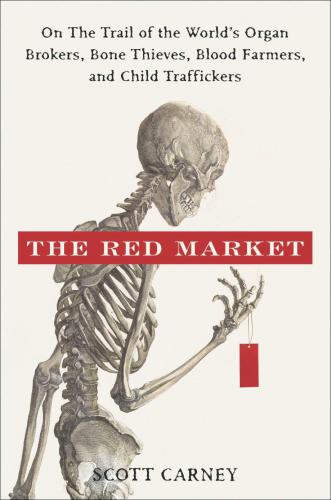
The Red Market
On the Trail of the World's Organ Brokers, Bone Thieves, Blood Farmers, and Child Traffickers
کتاب های مرتبط
- اطلاعات
- نقد و بررسی
- دیدگاه کاربران
نقد و بررسی

Starred review from March 21, 2011
Journalist Carney investigates the burgeoning underground economy in human organs, the world's "red market," in which bones, kidneys, ligaments, wombs, and human hair are harvested from the world's poorest people and sent to shore up faltering American and European bodies. "In Egypt, India, Pakistan, and the Philippines, entire villages sell organs, rent wombs," he writes. And the illusion that people selling their tissue "benefit from the transaction" is a devastating fantasy. "People who sell bodies and body parts rarely see their lives improved," he writes, and his accounts of the "body bazaar" are chilling: an Indian farmer who imprisoned men for years at a time in order to drain their blood for profit; Chinese prisons that treat their populations as de facto organ farms; Western families adopting children they believe are orphans who are, in reality, kidnapped. An important examination of the politics of "the red market" and the inequities that make it possible, the book makes a persuasive case that we must acknowledge and take responsibility for the red market, and medical innovation must be accompanied by ethical checks and "radical transparency"âlest our medical achievements precipitate horrific human cost.

April 15, 2011
Having written magazine articles on subjects like the buccaneer business model of Somali pirates and the dark side of overseas adoptions, Wired contributing editor Carney expands on time spent in India, Europe and America examining the illegal "red" marketplace for trafficked human body parts.
The author writes that "our appetite for human flesh is higher now than at any other time in history." Though the trade may appear barbaric, it is commonplace in places like Egypt and the Philippines, and most transactions are handled—to an outsider, at least—altruistically. As a post-graduate anthropology student, the author taught for many years in southern India, and his unsympathetic initiation into the "body business" came at the expense of a young American student and suicide victim upon whose increasingly perishable corpse descended a variety of locals who insinuated "demands on what was left of her material self." Elsewhere in India, Carney reports dramatic stories of a riverbank "bone factory" where 100 confiscated, grave-robbed human skulls might net $70,000 overseas, the atrocious for-profit kidnapping of children from city streets and orphanages and the contract-bound surrogate baby factories in Akanksha. A chapter on the latest advancements in the lucrative international brokers' market for living-donor kidneys is as startling as one on genetic egg harvesting—in exchange for sperm, Swiss fertility specialists can "basically FedEx you a baby." Less dour is the author's affably detailed stint "guinea-pigging" for a clinical trial of a "rebranded Viagra" and selling his hair for auction. As Carney highlights the most egregious of criminal red markets hoping to expose and recriminalize them, he impartially balances that perspective with arguments for industry legalization and demystifies its seductive "free market solution." Much akin to the work of Mary Roach, the result is a volume that lays bare the atrocities of the human flesh trade, reiterating the verity that "every corpse has a stakeholder."
Gruesomely fascinating.
(COPYRIGHT (2011) KIRKUS REVIEWS/NIELSEN BUSINESS MEDIA, INC. ALL RIGHTS RESERVED.)

May 15, 2011
In this impressively reported expos', Wired magazine contributing editor Carney raises disturbing questions about egg and organ donation, medical-school skeletons (some come from robbed graves), and adoption (some babies are stolen from their birth parents). Technically, organs may be donated, but big money is involved in transplanting them. Hospitals get $67,500 to harvest a kidney, and placing it into a recipient costs $259,000. Livers go for $523,000, and intestines for $1.2 million. Not surprisingly, many patients head overseas for bargain-basement deals. Carney also wants us to reconsider how pharmaceutical companies test drugs. Just out of grad school and poor, Carney was paid $3,200 to be a guinea pig for the first-phase dosage safety trial for the erectile dysfunction drug Levitra, and wound up with a splitting headache. Carney draws some controversial conclusions, advocating transparency: Every bag of blood should include the name of the original donor, every adopted child should have full access to his personal history, and every transplant recipient should know who gave him an organ. Like a top trial attorney, Carney makes his case convincingly.(Reprinted with permission of Booklist, copyright 2011, American Library Association.)

























دیدگاه کاربران